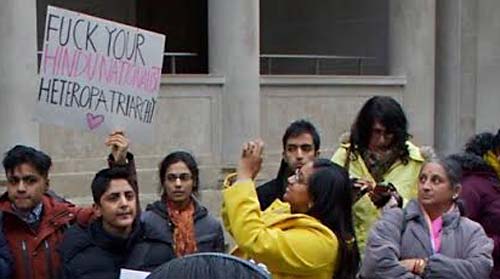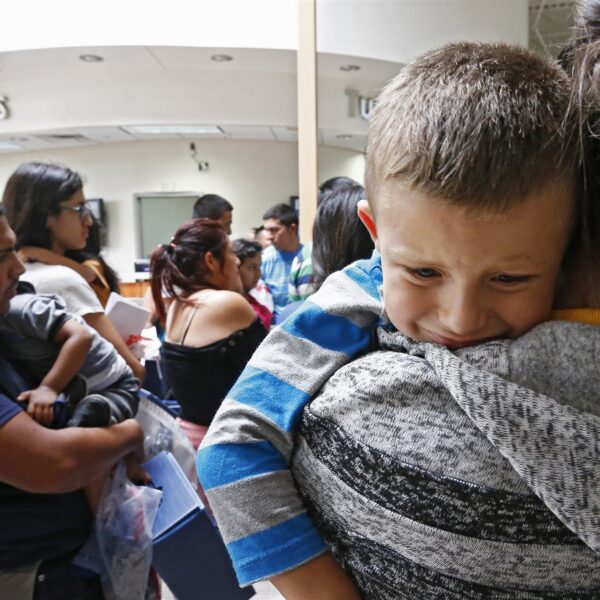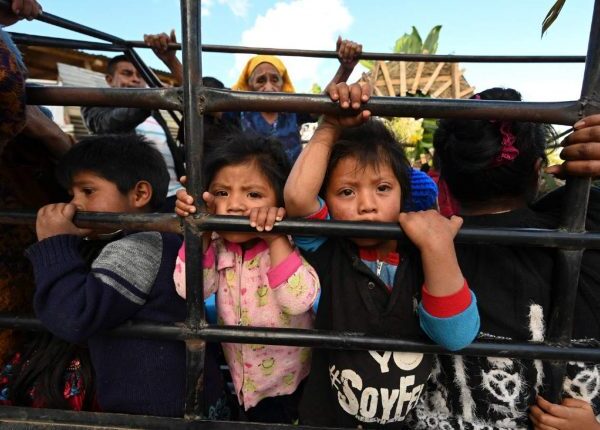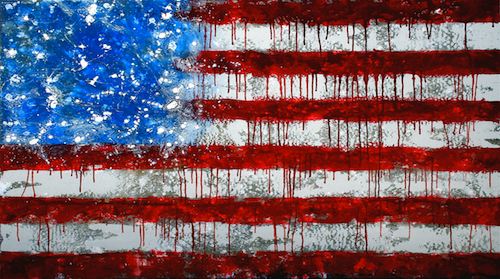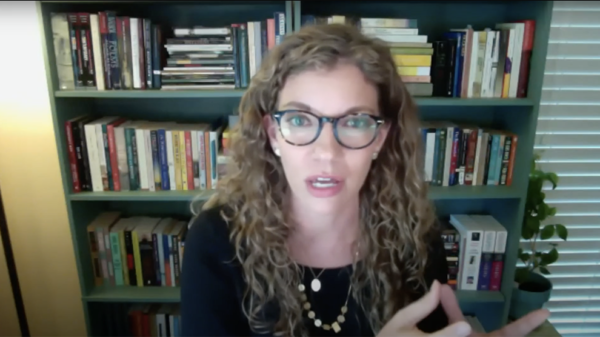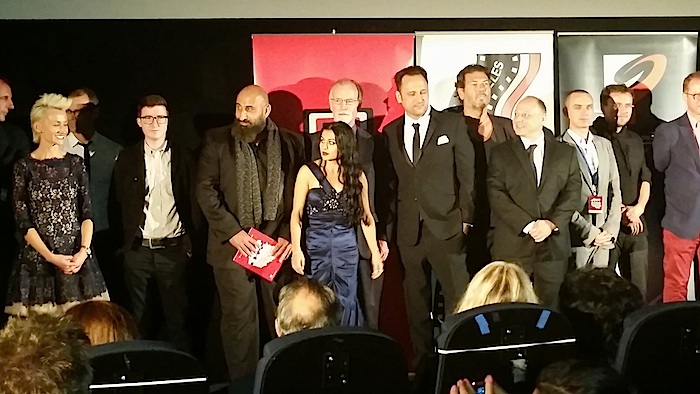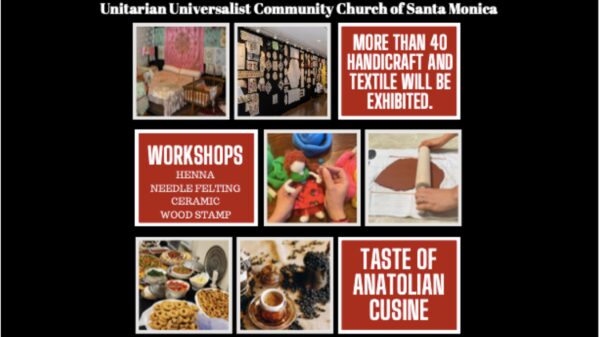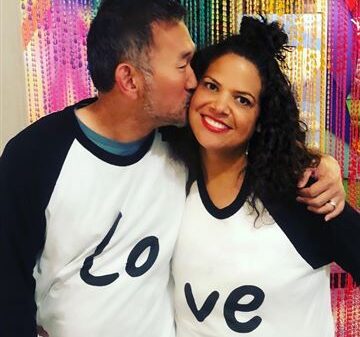India West/New America Media, News Report, Sunita Sohrabji
Pictured above: Hundreds of civil rights supporters gathered Dec. 15, 2013 at New York’s Union Square to denounce an Indian Supreme Court decision criminalizing gay sex. Yesterday, India’s Supreme Court upheld that ruling. Photo by Elizabeth Angell.
India’s Supreme Court yesterday upheld its December ruling that criminalizes gay sex. But civil rights attorneys and LGBT activists say the announcement could actually be an unexpected boon for Indians fleeing the country to seek asylum in the United States.
On Jan. 28, the Indian Supreme Court upheld its decision to reinstate a 153-year-old colonial law prohibiting “carnal intercourse against the order of nature with any man, woman or animal.”
The law was struck down in 2009 by a lower court in New Delhi, a decision that was cheered by Indian lesbians, gays, bisexuals and transgender people. But last month, on Dec. 11, 2013, the Indian Supreme Court overruled the lower court’s decision, saying that only Parliament could determine the matter. The announcement was met by massive protests calling for a review of the decision. Yesterday, however, the Court made it clear that the ruling would stand and no such review would take place.
The ban on gay sex in India has outraged the LGBT community both in India and the United States. But some say it may turn out to have one unexpected benefit for gay Indians seeking asylum in the United States: They will now be able to demonstrate a “credible fear of persecution” in their home country when applying for asylum.
Clement Lee, an attorney with Immigration Equality, told India-West that he predicted the Supreme Court decision might be “the beginning of a shift of political asylum cases from India,” since gays, lesbians, bisexual and transgender people once again face imprisonment in India if they are caught engaging in sex.
Shortly after the Indian Supreme Court ruling last month, India-West broke the story of a gay Indian couple who had fled from India in June 2012, and traveled mostly by foot through Cyprus, Dubai and several South American countries before turning up at the U.S.-Mexico border in Texas, where they immediately asked for asylum.
The couple, Jagdish Kumar, from the village of Rewari outside New Delhi, and Sukhwinder, a former resident of Chandigarh who is only known by his first name, was detained for six months in Immigration Customs and Enforcement (ICE) detention facilities in El Paso, Texas. Repeated requests to share a cellblock were denied by ICE officials.
The couple could also have been paroled as their asylum cases were reviewed, but ICE officials did not allow Jagdish and Sukhwinder to live near each other while they were in detention.
In his ICE interview, Kumar told officials that his family had forced him to marry a woman, despite his sexual orientation. Kumar’s own uncle had also been badly beaten up by the family and had to be hospitalized because he did not wish to marry a woman. Once married, Kumar and his new bride settled in Chandigarh, where Kumar met Sukhwinder, a dance instructor. Some time after meeting, the couple decided to flee India to seek asylum in the United States. Lacking economic resources, the couple made the long, arduous process in the hopes of attaining freedom, but were immediately detained at the U.S. border.
Virginia Kice, ICE Western regional communications director, referred to a 2009 memo written by former ICE Assistant Secretary John Morton, which states that “ICE will generally release from detention arriving asylum seekers who have a credible fear of persecution or torture if certain criteria are met.”
Kice told India-West she could not specifically comment on Kumar and Sukhwinder’s cases, but quoted the 2009 policy, saying: “The new policy permits the parole from detention of aliens arriving at U.S. ports of entry who establish their identities, pose neither a flight risk nor a danger to the community, have a credible fear of persecution or torture, and have no additional factors that weigh against their release.”
Kice could not say why Sukhwinder and Kumar were not paroled, despite four requests. The couple were granted asylum in late December and now live with Kumar’s cousin in La Crosse, Wisconsin.
Lee from Immigration Equality handled the couple’s case and told India-West the December 2013 ruling by the Indian Supreme Court was key in winning asylum for the pair, since now there was a legally backed fear of persecution in India.
Leila Roberts, a spokeswoman for the Organization for Refuge, Asylum and Mediation (ORAM), told India-West that the path to refugee or asylum status is “fraught with danger every step of the way.” Officers are often not trained in how to address LGBT people, “even if they’re well-meaning,” she said.
ORAM recently conducted an extensive training in several countries, teaching refugee professionals how to handle those who are “non-conforming” in their sexuality.
Asylum seekers do not have the right to work or to access any benefits in the United States until their case is resolved, explained Roberts.
Madhuri Anji, co-chair of the LGBT civil rights organization Trikone, told India-West that attaining asylum in the United States is “a double-edged sword. Once you seek asylum, there is no going back to India. You’re facing another side of this issue,” she said.
Trikone has helped a handful of LGBT Indians successfully apply for asylum, and Anji said she personally knows of many people who have been forced into a marriage, despite their sexuality. For example, some lesbian women who were forced to marry have claimed a case of rape, and therefore persecution, in their attempt to seek asylum, she said.
Chand Nirankari, a community advocate with the South Asian Network and Satrang, a gay civil rights organization in Southern California, told India-West that the gay community in India and the United States had predicted the Supreme Court would not reverse its ruling, but now hopes that the Indian Parliament will intervene.
She said the opposition party in Parliament, BJP, has been promoting a largely homophobic rhetoric. Nirankari has more hope for Sonia Gandhi, leader of the Congress party, who she said was a role model for the Indian LGBT community.
Nirankari, meanwhile, said her own parents are still pressuring her brother to marry a woman, despite the fact that he’s gay.
“It is difficult for parents to understand that these are colonial-era laws we no longer need to abide by,” Nirankari said.
This article was produced as part of New America Media’s LGBT immigration reporting fellowship sponsored by the Four Freedoms Fund.

